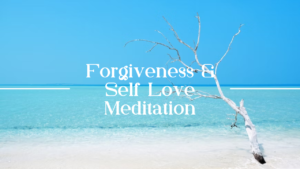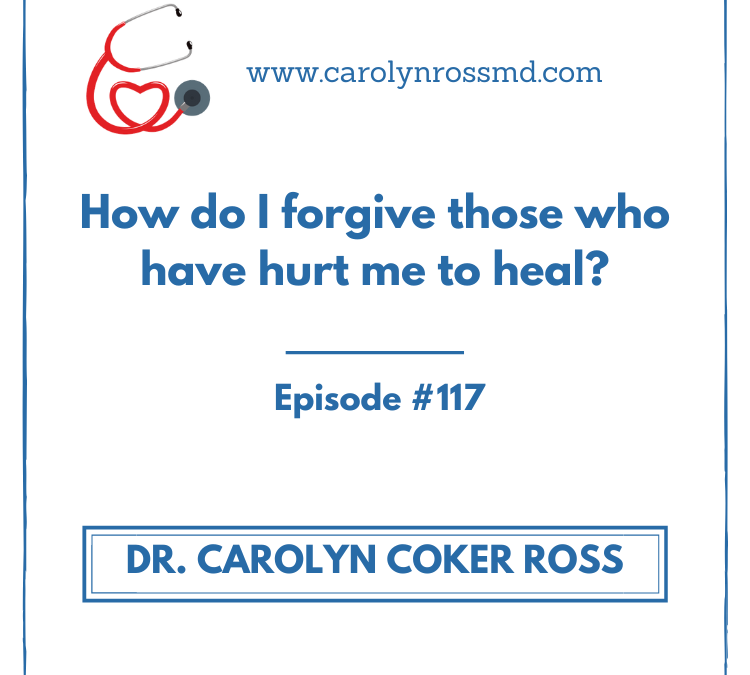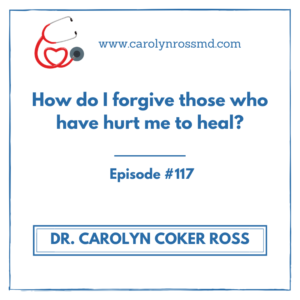In this podcast, I will be discussing the importance of forgiveness, including self-forgiveness for people with binge eating, emotional eating and food addiction. Forgiveness is an inherently selfish act – it is something that benefits you more than it benefits the person you forgive. The most difficult but most impactful form of forgiveness is self-forgiveness. How have you harmed others? I will discuss the difference between apologizing and forgiving.
In this episode, you will learn:
1. What health problems are associated with lack of forgiveness?
2. How do you define self-forgiveness?
3. When is it inappropriate to forgive another person or to forgive yourself?
HOMEWORK:
1. Journal about situations or people who have harmed you, what emotion you have about this and whether you are ready to forgive them or not.
2. For those you are not ready to forgive, ask yourself what it costs YOU to not forgive them.
Example: If your partner cheated on you, you may still feel angry and hurt and may not be ready to forgive. The cost of not forgive may be: My lack of forgiveness and continuing anger have affected my ability to work successfully with her on issues related to our kids. It also makes it hard for me to trust other women I date.
3. Listen to the forgiveness meditation below daily for at least a week (preferably one month). 
Don’t miss the upcoming Fall Anchor Program. Schedule a free consult to discuss your food and body image issues: https://findingyouranchor.as.me/consult
Get a free copy of The Food Addiction Recovery Workbook” (I pay for the book, you pay for postage/ handling) foodaddictionrecoveryworkbook.com
Use this link to get your free e-book of “The Food Addiction Recovery Workbook.” (you pay for handling charge only),
https://www.foodaddictionrecoveryworkbook.com/ebook
Most moral, spiritual and religious traditions tell us that to forgive is a virtue. And as we know, there are a lot of consequences of not forgiving, and that can show up in many forms, whether it be unexpected relationship breakups, family trauma, or betrayal of any kind that can lead to resentment. It can be a really difficult task to choose to let go of past hurts and begin to heal, but the decision to forgive is really the thing that leads to a happier and more fulfilling light.
Now, Desmond Tutu, the South African Bishop says forgiveness is simply about understanding that every one of us is both inherently good and inherently flawed. Forgiveness can show up in stunning ways and in unexpected situations. For example, we expect the people who are the victims of violence or trauma to be angry, and we don’t expect them to forgive their perpetrator, but it does happen. For example, long time ago, a horrific shooting occurred at an Amish School in Nickel Mines, Pennsylvania. I think it was back in 2006, and the response of the Amish people was one of forgiveness rather than anger. Relatives of slain children have gone on national media and advised forgiveness rather than hatred of the killer. And similarly, women who have been brutally raped sometimes speak of forgiving their rapist so they can free themselves from anger and pain. So it’s important to note that forgiveness doesn’t mean that you condone whatever happened, that you’re not saying that you are wrong and the other person is right, or that you have to pretend like nothing happened. You don’t have to become best friends with someone who hurt you or abused you.
In some ways as I mentioned earlier, forgiveness is a selfish act. It’s done not to make the situation go away, but to free you from anger and bitterness to be able to release that harmful toxic stress in your body and allow you to move forward with your life. Living with a sense of betrayal or a feeling that life is unfair can cause depression, physical health problems, and relationship difficulties. And I don’t know about you, but I know that I have a lot of things that I’ve had to work hard to forgive, things that where I felt that I was mistreated or in particular, betrayals from close friends, and I’ve had to work really hard to let go of those feelings of hurt and anger. The other thing is sometimes it’s harder to forgive ourselves for something that we’ve done to someone that is equally damaging, and this lack of self-forgiveness can cause low self-esteem, isolation, and inability to feel you deserve a good life. So, you know, let’s look at some examples. If a family member has bailed you out of credit card debt related to your binge eating or, or paid for you to get treatment for example, you may blame yourself for the trouble that your binge eating, emotional eating or food addiction put this family member through and you may have difficulty for giving. Or your eating disorder may have contributed to difficulties in your relationship with a friend. Denying yourself forgiveness on issues like these can be one of the many triggers for binges and for food obsession and body image issues. It can lead to increasing negative self talk. You know, I’m not worthy, I’m not good enough, all of those things. And can have a negative effect on your self-esteem.
On the other hand, forgiveness has a positive effect on our health and wellbeing. So in studies on college students that college students who are able to forgive themselves and others enjoy better physical health and self-forgiveness has an even stronger benefit to good health than forgiving others. Individuals who are able to be forgiving of themselves and others may also have lower blood pressure and they may be have better ability to recover from the effects of stress on the heart. Forgiveness is also associated with less medication use, less alcohol abuse, and fewer physical symptoms. So, you know, as we’re talking, I know for me, just talking about this subject brings up a lot of memories of, you know, things that, harms that have been done to me and also harms that I have done, whether consciously or unconsciously, whether it was my intention to harm someone else or not. And you know, it brings up a lot of regret. Sadness and sometimes anger and shame and so on. So just keep staying aware of what you’re feeling as we continue to talk about forgiveness and self-forgiveness.
So Maya Angelou said it’s one of the greatest gifts you can give to yourself to forgive. She says, Forgive everybody. And as I mentioned, often we struggle to forgive ourselves more than we struggle with forgiving other people, but both are equal important. When you are able to dig deep and recognize how your behaviors have harmed other people, and then you can take responsibility for it, you can own it, you’ll be able to move towards forgiveness.
So, you know, oftentimes we as mothers in particular, or parents may have things that we don’t even wanna think about. Mistakes that we’ve made with our children, whether they be small or large, whether they be intentional or not intentional. So that’s another area where a self-forgiveness may be important to look at. So when we practice self-forgiveness, it’s not taking the easy way out. We own our actions, and then by owning them, taking responsibility for those actions, we’re able to gradually move to a place of self-compassion and then growth. So self-forgiveness is not an on off switch that you know, easily can turn on and, oh, I forgive myself and everything’s fine. That’s what I call a spiritual bypass. When you, you know, you say the right things, but you haven’t changed anything in your life or taken action to make amends to someone else, but then you pretend that there’s no problem and expect them to do the same. So it’s not an on off switch it’s a process that happens over time and by doing your own emotional work and reflection.
So self forgiveness requires striking a balance between that taking responsibility and owning it while not beating yourself up at the same time. So you wanna practice acts of positive self-regard while you are taking responsibility, maintaining a sense, a positive sense of yourself. So not beating yourself up like, I’m a bad person and that’s something I can’t forgive, and all I feel is shame. No, it would be, you know, I did this and I recognize that I’m only human, so I will make mistakes, but I’m sorry for the mistake I made.
When you successfully find this equilibrium, you reach self-forgiveness. So there is a group called the Human Development Study Group, and they were the first to offer an actual definition of self-forgiveness, which they defined as a willingness to abandon self-resentment in the face of one’s acknowledged objective wrong while fostering compassion, generosity, and love towards oneself. So a willingness to stop beating yourself up in the face of taking responsibility for something you did wrong, and at the same time, fostering compassion, generosity, and love towards yourself. They highlighted three important pillars of self-forgiveness. The first is the release of negative emotions directed towards yourself. So if you are feeling just enormous amount of shame or guilt or anger, you wanna start by trying to sit with that feeling and recognize what it is. Sometimes journaling about it can help, meditating on it can help. But just acknowledging what you feel like, Wow, I’m, I just am covered in shame. And then seeing if you could release that negative emotion that you’re directing towards yourself.
Number two is the cultivation of positive emotions direct towards yourself. And sometimes you have to start with a neutral emotion. You can’t always say, You know, I did a bad thing, but I love myself, and so everything’s fine. That’s, again, that’s the spiritual bypass. So it would be something like, I’m covered in shame, but again, I know I’m not a bad person. I just am a person who’s made a mistake.
And then number three, accept responsibility. So self-forgiveness doesn’t mean you get to skip feeling bad, and that’s what I’m talking about. When you try to skip all the negative stuff, you’re doing a spiritual bypass. You go from things are horrible to I’m okay and everything’s okay, and nothing bad happened and that just isn’t effective. But self-forgiveness really just means that you work through the feelings of any of the negative feelings you have towards yourself. And then let those feelings go once they’ve given you the opportunity to serve their purpose. So the purpose might be to help you go deeper into understanding yourself. The purpose might be to help you understand the harm that you caused more deeply. Initially these negative or remorseful or regretful feelings can be useful to also motivate you to make amends. Yeah, so you know, again, if you only just, you know, cut off the negative emotions and then shower yourself with, you know, optimism or positive emotions, that’s the spiritual bypass. I wanna just hammer that home.
True self forgiveness involves owning your mistake. Now when a person has caused harm to another, it’s important that self-forgiveness should also include an other focused component where the person makes amends in whatever way is appropriate. So making amends doesn’t mean that if you ex-partner, if they don’t wanna see you, and they’ve made that very clear. And then you force yourself on them so you can relieve yourself and make amends. That’s not appropriate. So often it’s useful, especially in high conflict situations or situations where there is a lot of shame that you work with a therapist to talk through what’s the appropriate response. So that’s important.
When working with people to, you know, reach self-forgiveness what we wanna do is recognize when it’s not appropriate to use self forgiveness. For example, when working with victims of sexual assault. Taking responsibility is not appropriate and you have, you know, I’ve had so many patients, especially women, who say, well, it’s my fault because I was drunk and that’s why, you know, I got raped. That’s not appropriate because that is not your responsibility. It is the responsibility of the perpetrator. So, you know, trying to say, Well this happened because of my fault, and then trying to use self forgiveness really will. Those harmful feelings of self blame even worse. In other situations, like when someone is continuing to harm another person. So for example, in the case of domestic abuse is not fully. When that person is not willing to accept responsibility for their actions and they continue doing the same actions and forgiveness is not appropriate, that’s premature. Self forgiveness could doll the incentive to change behavior. So if you are continuing to hurt another person and you’re not willing to take responsibility, then self-forgiveness is very inappropriate. And I would say if you are the person who’s being victimized ongoingly, then forgiveness of your perpetrator is not appropriate because again, they haven’t changed their actions. So, you know, I mean a lot of people say, Well, I said I’m, I was sorry. What do you want from me? And they think that just saying those words shows us that they’ve progressed in recovery. But apologies are just words and easier to say than to demonstrate by actions, how sorry you are, by changing your behavior.
So when you are in recovery, your actions and your intentions must be aligned. We know that when you’re not in recovery, that isn’t happening. Your actions and your attentions are are not aligned and many times you may be making excuses for why you haven’t done something you said you would do. So we’ve talked a little bit about that and I wanna just give you another quote from a Mother Theresa who says, If we really want to love, we must learn how to forgive.
So I hope this podcast has been helpful. I’m gonna give you a little homework, which I’ll leave in the show notes. And the first question is, or, or the first part of homework is journal about situations or people who have harmed you. What emotion you have about this? And whether you are ready to forgive them or not.
Number two, for those you’re not ready to forgive, ask yourself what it’s costing you to not forgive them? So an example is if your partner cheated on you, you may still feel angry and hurt and may not be ready to forgive, and the cost of not forgiving may be continuing anger that affects your ability to co-parent with your ex-partner. And it also may make it hard for you to trust another partner in the future.
And then number three, I’ve included a link to the forgiveness meditation that I would recommend that you listen to for a month. But if the month is too long, at least listen for a week. So thank you so much for listening. I hope this has opened your eyes to looking at the power of forgiveness to free you from those negative feelings, low self-esteem, and being trapped in that kind of round and round that goes on in our heads where we relive those old events.
So forgiveness of others and also self-forgiveness is what will for you. I will be talking to you soon. Thanks for listening.









